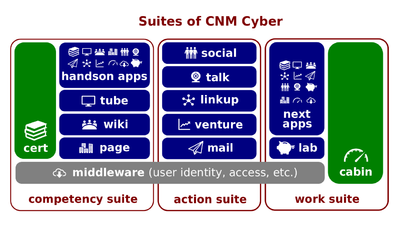Difference between revisions of "Recruiters' Essentials"
(→Outline) |
|||
| Line 14: | Line 14: | ||
!#!!Referred topics | !#!!Referred topics | ||
|- | |- | ||
| − | ![[ | + | ![[Who Recruiters Are]] |
|1|| | |1|| | ||
|- | |- | ||
| − | ![[ | + | ![[Third-Party Recruiters]] |
| + | |2|| | ||
| + | |- | ||
| + | ![[What Recruiters Do]] | ||
|2|| | |2|| | ||
|} | |} | ||
Revision as of 09:06, 30 April 2020
The Recruiters' Essentials (hereinafter, the Lesson) is the lesson of CNM Cyber that introduces its participants to CNM Cyber Orientation. The Lesson belongs to the Introduction to Recruitment session of the CNM Cyber Orientation.
The Lesson is made up of three lectios. At CNM Cyber, the word, lectio, is used for a lesson part.
Contents
Summaries
Predecessor
- The predecessor lesson is Screening of Job Candidates.
Outline
Recruiters' Essentials Lectios # Referred topics Who Recruiters Are 1 Third-Party Recruiters 2 What Recruiters Do 2
Successor
- The successor lesson is Career Essentials.
See also

Recruiters' Essentials is the last lectio (or lesson part) in the Introduction to Recruitment lesson. The lesson itself is the third in CNM Cyber Orientation. Consequently, the Orientation is the first stage of WorldOpp Pipeline.
This wikipage presents its full script and those test questions that are related to that lectio.
Recruiters' Essentials
- Main wikipage: Recruiters' Essentials; video (6:10)
- Recruitment service. Any service related to recruitment.
- Recruiter. A legal entity whose business is to enlist or enroll people as employees, students, or as members of an organization.
- Retained recruiter. A recruiter who is paid for the time spent while recruiting regardless of the fact whether qualified sources are identified, hired, or not.
- Contingency recruiter. A recruiter who is paid only when qualified sources are identified and hired.
- Hiring manager. A representative of the employer responsible for hiring one or more employees to fill open positions. That manager may work for that employer as an employee, be hired as an independent contractor, or be an employee of another recruiter.
- Outsourced recruitment. The whole recruitment or its part that is outsourced to another legal entity, either an individual or an organization.
- Employment agency. Any entity that matches employers and employment candidates.
- Staffing firm. Any entity that provides employers with their staffers.
- Temporary staffing provider. Any entity that provides employers with temporary staffers.
- Headhunter (executive search provider or headhunting provider). A specialized recruitment service designed to provide employers with highly qualified employment candidates especially for senior-level and executive jobs.
- Recruitment fee. The fee that an employer agrees to pay as compensation for sourcing, screening, and, sometimes, selecting one or more employment candidates.
- Placement fee. The fee that an employer agrees to pay a contingency recruiter as compensation for placing one or more employment candidates into specified employment. In the United States, those fees are typically collected as a percentage of the annual salary of the hired, ranging between 20% to 33%.
- Referral fee (finder's fee). A commission paid to an intermediary or the facilitator of a business transaction. This fee is rewarded because the intermediary discovered the deal and brought it forth to interested parties. Depending on the circumstance, this fee can be paid by either the transaction's buyer or seller. In the United States, either an employer or a recruiter may pay the fee for finding the right employment candidate. For instance, an employer may pay the fee to its current employee instead of paying the placement fee to a contingency recruiter. Or a contingency recruiter may pay the fee from its placement fee, etc.
Introduction to Careers is the successor session.
Script
The video of the presentation is published at https://youtu.be/daMa4wfSjDM (6:10). Here is its full text.
Overview
- Welcome to Recruiters' Essentials. In this brief presentation, we are going to take a look at recruiters in general and their various types. Recruitment fees will be a separate topic of this presentation. Let's get begun.
What recruiters do
- This is any service related to recruitment and the recruiter is a legal entity whose business is to list or enroll people as employees or as members of an organization. Recruiter can be a company and it can be an individual, like independent contractor. It can be a person who is an employee of a company itself. There are many types of recruiters.
Retainers vs contingencies
- Let's talk about retained verses contingency recruiters. Retained recruiter is a recruiter who is paid for the time spent while recruiting regardless of the fact whether qualified services are identified, hired or not. Recruiters who are part of the company, employees they technically can be considered as retained recruiters. On the opposite side contingency recruiter is a recruiter who is paid only when qualified services are identified and hired.
Hiring managers
- Recruiters don't do the whole process, usually recruiters source, screen candidates but someone called hiring manager makes the decision. Sometimes there are several hiring managers. Some companies, recruitment process is pretty complicated with series of interviews on different levels or some, it could be like a panel interview, so it is several people responsible for hiring. When recruiters source, screen and other people like hiring managers, they make a decision. What usually recruiters is looking for is not necessarily what the hiring manager is looking for.
Outsourced recruitment
- Companies recruit on themselves, but many companies also outsource their recruitment, they outsource to employment agencies, to staffing firms, temporary staffing provider and headhunters. Headhunters work with only executive level, senior level, C-Level jobs and executive jobs.
- Temporary staffing, some recruitment companies actually provide staffers instead of temporary staffers, so a company has a chance for instance to hire an accountant who want to use an accountant from this temporary staffing company or staffing provider. In this case, instead of hiring a person they will just use someone`s services and employment agency is any entity which measures an employment candidate.
- There is some overlapping difference between employment agency and staffing firm, staffing firm usually working with employers. An employment agency mostly works with the employment candidates.
Recruiters' fees
- How recruiters are paid especially if they are independent, usually recruiters are paid placement fee. Usually in America placement fee is about 20 to 33% of the salary of the hired. For instance, a recruited person is paid $100,000 the placement fee for the recruiter will be $25,000. Referral fee is also considered as a recruitment fee. Referral fee is only like a finder fee, for instance I suggest someone that this person can be hired and I brought a resume or application from that person. In this case I can get this referral fee. When we get back to finding potential candidates, when a company sends this like e-network message, sometimes companies states that they are looking for an accountant and your referral fee can be let`s say $200. In this case they are saving money on recruiters because they will recruit this person directly, they don`t need recruiters to reach out to look, to screen etc.
- Sometimes recruiters can pay this referral fees if someone finds a referral candidate for them.
Summary
- This concludes the Recruiters' Essentials presentation. We have defined recruitment services and taken a look at two models of how recruiters get paid: retained and contingency. We have also made stops by various types of outsourced recruitments such as employment agencies, staffing firms, temporary staffing providers, and headhunters. Special considerations were given to recruitment fees. If you haven't done yet so, you are now welcome to move to Career Essentials.
Quiz questions
- Every statement below is split into one true and one false question in the actual exam.
- Recruitment service is (not) any service related to recruitment.
- Employment agency is (not) any entity that matches employers and employment candidates.
- Staffing firm is (not) any entity that provides employers with their staffers.
- (Not) every recruiter is an employee of the employer who is hiring.
- (Not) every recruiter is paid for the candidates that he or she sourced, screened, and selected.
- Retained recruiter is (not) paid for the time spent while recruiting.
- Retained recruiter is (not) paid only when qualified sources are identified and hired.
- Contingency recruiter is (not) paid for the time spent while recruiting.
- Contingency recruiter is (not) paid only when qualified sources are identified and hired.
See also
- Career Essentials. The first presentation in Introduction to Careers.
- Screening of Job Candidates. The fourth presentation in Introduction to Recruitment.

